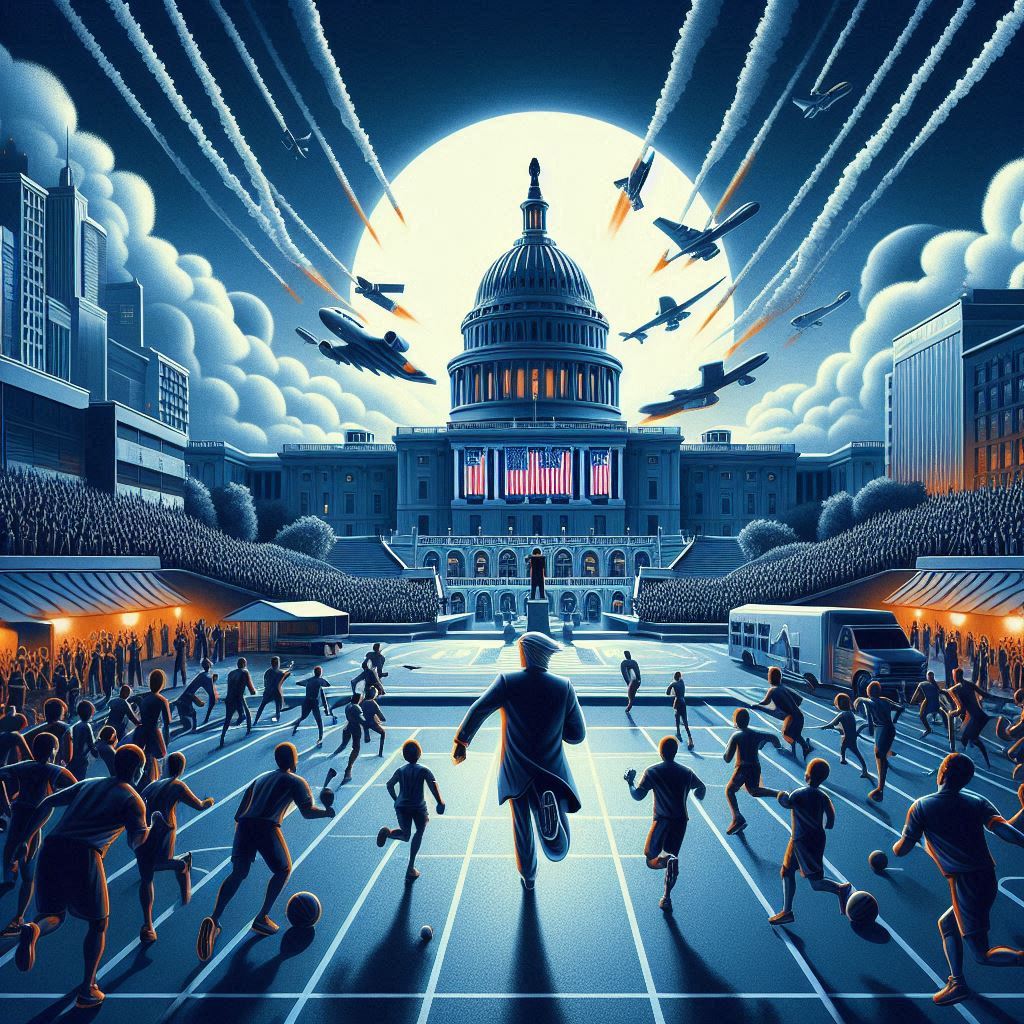The Impact of Tomorrow’s Inauguration on Sports in America and Worldwide beyond uncertain 2025
Politics & Sports
Sports politics In 2025 & Beyond
As the world eagerly anticipates the upcoming presidential inauguration in the United States, there is a great deal of speculation about the potential implications for various sectors, including the world of sports. While the direct impact of an inauguration on sports might not be immediately apparent, the political, economic, and social changes that accompany a new administration can have far-reaching effects on the sports landscape both domestically and internationally. This blog post explores several key areas where these changes might manifest and considers the broader implications for the future of sports.
Policy Shifts and Their Ripple Effects
New administrations often bring shifts in priorities, which can lead to significant changes in policy and funding for sports programs and facilities. A new president might emphasize physical education in schools or invest in infrastructure for sports facilities, impacting the development of athletes and the popularity of sports over time.

International Sports Relations
Presidential inaugurations can influence international relations, subsequently affecting sports diplomacy. Sports have long been a tool for fostering international goodwill and understanding. A new administration might seek to strengthen ties with other countries through sports exchanges, tournaments, and collaborations, leading to more international competitions and opportunities for athletes to compete globally.
Economic Policies and Sports
The economic policies of a new administration can have a significant impact on sports. Changes in tax laws, trade agreements, and economic incentives can affect the financial health of sports organizations, teams, and athletes. For instance, tax breaks for sports franchises or incentives for hosting major sporting events can boost local economies and create more opportunities for athletes and fans.

Sports & Public
Media Landscape and Sponsorship
The media landscape and sponsorship deals can be influenced by the political climate. A new administration might bring changes in media regulations or advertising policies, affecting how sports are covered and promoted. Additionally, companies might adjust their sponsorship strategies based on the political environment, leading to shifts in funding and support for sports teams and events.
Public Sentiment and Participation
The political climate following an inauguration can influence public sentiment and participation in sports. A new administration’s stance on issues such as immigration, healthcare, and education can impact the lives of athletes and fans alike. Policies that promote inclusivity and diversity can encourage more people to participate in sports, while restrictive policies might have the opposite effect.

Sports Interaction
Environmental Policies and Sports
Environmental policies enacted by a new administration can also affect sports, especially outdoor sports. Policies aimed at combating climate change, preserving natural resources, and reducing pollution can create a more sustainable environment for sports activities. Conversely, lax environmental policies might lead to challenges such as extreme weather conditions affecting sports events.
Technological Advancements and Innovation
The stance of a new administration on technology and innovation can drive changes in sports. Support for research and development in sports technology can lead to advancements in equipment, training methods, and injury prevention. This can enhance athletes’ performance and make sports more enjoyable for fans.
Sports as a Platform for Social Issues
Sports have historically been a platform for addressing social issues, and the political climate can amplify this role. A new administration’s approach to social justice, equality, and human rights can influence how athletes and sports organizations engage with these issues. This can lead to increased advocacy and activism within the sports community.
Impact on Youth Sports
The policies and priorities of a new administration can affect youth sports programs. Support for education and community initiatives can lead to more resources and opportunities for young athletes. Conversely, budget cuts or policy changes can limit access to sports programs for children and teens, affecting their physical and emotional development.
The Future of Sports Governance
The political landscape can shape the future of sports governance. A new administration might advocate for changes in how sports organizations are regulated and managed, promoting transparency, fairness, and accountability. This can have a lasting impact on the integrity and sustainability of sports.

The Polarization of Sports
Sports Change
In recent years, sports have increasingly become a battleground for cultural and political issues, and the upcoming inauguration might exacerbate this trend. As the new administration takes office, its policies and public statements could further polarize the sports community.
Political Alignments
Athletes, coaches, and sports organizations often express their political views, and a new administration can intensify these expressions. Depending on the administration’s stance on key issues, it could lead to more vocal and visible support or opposition from the sports community, deepening existing divides.
Social Justice Movements
Sports have become a prominent platform for social justice movements. A new administration’s approach to social and racial issues can influence how athletes and sports organizations engage with these causes. For instance, support for or against movements like Black Lives Matter can polarize fans and participants, leading to more contentious debates within the sports world.
Media and Public Perception
Media coverage of sports and politics can amplify polarization. The way media outlets report on athletes’ political statements and actions can shape public perception and fuel divisive narratives. A new administration’s relationship with the media can either calm or inflame these tensions, affecting how sports are perceived by the public.
Economic Disparities
Economic policies can also contribute to polarization in sports. Changes in funding for community sports programs, access to resources, and opportunities for athletes from different backgrounds can exacerbate existing inequalities. This can lead to greater division between professional and amateur sports, as well as between different demographic groups.
Fan Base Divisions
The political climate can influence fan behavior and loyalty. Fans who align with or oppose the administration’s policies might project their views onto their favorite teams and athletes. This can create rifts among fan bases, where sports events become arenas for political expression rather than just athletic competition.
Conclusion
While the direct impact of an inauguration on sports in 2025 might not be immediately obvious, the ripple effects can be far-reaching. From policy changes and funding to international relations and public sentiment, the political landscape can shape the world of sports in numerous ways. As we await tomorrow’s inauguration, it’s important to consider how these changes might influence the sports we love and the athletes who inspire us. Whether sports will become more polarized or serve as a unifying force remains to be seen, but one thing is certain, the intersection of sports and politics will continue to be a dynamic and influential space.
Join the Discussion
How do you think tomorrow’s inauguration will impact the world of sports? Will the new administration’s policies and priorities lead to positive changes, or do you foresee new challenges arising?







4 Comments
Comments are closed.